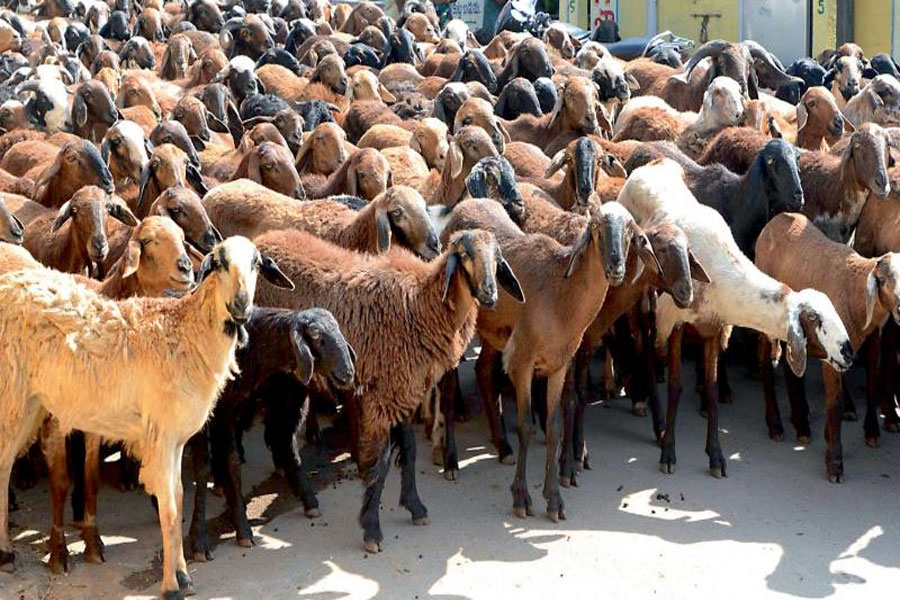National
50K wild species meet needs of billions worldwide: Report

Billions of people, in developed and developing nations, benefit daily from the use of wild species for food, energy, materials, medicine, recreation, inspiration and many other vital contributions to human well-being.
The accelerating global biodiversity crisis, with a million species of plants and animals facing extinction, threatens these contributions to people.
A new report by the Intergovernmental Science-Policy Platform on Biodiversity and Ecosystem Services (IPBES) on Friday offered insights, analysis and tools to establish more sustainable use of wild species of plants, animals, fungi and algae around the world.
Sustainable use is when biodiversity and ecosystem functioning are maintained while contributing to human wellbeing.
The IPBES Assessment Report on the Sustainable Use of Wild Species is the result of four years of work by 85 leading experts from the natural and social sciences, and holders of indigenous and local knowledge, as well as 200 contributing authors, drawing on more than 6,200 sources.
The summary of the report was approved this week by representatives of the 139 member states of IPBES in Bonn in Germany.
“With about 50,000 wild species used through different practices, including more than 10,000 wild species harvested directly for human food, rural people in developing countries are most at risk from unsustainable use, with lack of complementary alternatives often forcing them to further exploit wild species already at risk,” said Jean-Marc Fromentin (France), who co-chaired the assessment with Marla R. Emery (USA/Norway) and John Donaldson (South Africa).
“Seventy per cent of the world’s poor are directly dependent on wild species. One in five people rely on wild plants, algae and fungi for their food and income; 2.4 billion rely on fuel wood for cooking and about 90 per cent of the 120 million people working in capture fisheries are supported by small-scale fishing,” said Emery.
“But the regular use of wild species is extremely important not only in the Global South. From the fish that we eat, to medicines, cosmetics, decoration and recreation, wild species’ use is much more prevalent than most people realise.”
The use of wild species is an important source of income for millions of people worldwide.
Wild tree species account for two thirds of global industrial roundwood; trade in wild plants, algae and fungi is a billion-dollar industry; and even non-extractive uses of wild species are big business.
Tourism, based on observing wild species, is one of the main reasons that, prior to the Covid-19 pandemic, protected areas globally received eight billion visitors and generated $600 billion every year.
The report identifies five broad categories of ‘practices’ in the use of wild species: fishing; gathering; logging; terrestrial animal harvesting (including hunting); and non-extractive practices, such as observing.
For each practice, it then examines specific auses’ such as for food and feed; materials; medicine, energy; recreation; ceremony; learning and decoration –providing a detailed analysis of the trends in each, over the past 20 years.
In most cases, use of wild species has increased, but sustainability of use has varied, such as in gathering for medicine and logging for materials and energy.
Speaking specifically about fishing as an example, Fromentin said: “Recent global estimates confirm that about 34 per cent of marine wild fish stocks are overfished and 66 per cent are fished within biologically sustainable levels — but within this global picture there are significant local and contextual variations.
“Countries with robust fisheries management have seen stocks increasing in abundance. The Atlantic bluefin tuna population, for instance, has been rebuilt and is now fished within sustainable levels.
“For countries and regions with low intensity fisheries management measures, however, the status of stocks is often poorly known, but generally believed to be below the abundance that would maximise sustainable food production.
“Many small-scale fisheries are unsustainable or only partially sustainable, especially in Africa for both inland and marine fisheries, and in Asia, Latin America and Europe for coastal fisheries.”
Illegal use and illegal trade in wild species are also addressed in the report — as this occurs across all of the practices and often leads to unsustainable use.
The authors find that illegal trade in wild species represents the third largest class of all illegal trade — with estimated annual values of up to $199 billion.
Timber and fish make up the largest volumes and value of illegal trade in wild species.
National
Police in Srinagar attach property worth Rs 1.5 crore under UAPA

Srinagar, July 5: Continuing its drive against terrorism, Jammu and Kashmir (J&K) Police in Srinagar district on Saturday attached property worth Rs 1.5 crore under the Unlawful Activities Prevention Act (UAPA).
A police statement said on Saturday, “In a decisive move against the terror ecosystem and to dismantle its supporting infrastructure, Srinagar Police has attached a residential property — comprising 8 marlas and 202 sq. ft. of land along with the building structure— estimated to be worth approximately Rs 1.5 crore.
“The property, located at Mir Masjid Mohalla, Shallabagh Khanyar, and falling under Survey Nos. 3674/1147 and 3677/1148, is recorded in the name of Mohammad Yousuf Shah son of Hafiz Waliuallah Shah.”
The police statement added, “It is currently in the possession of Masood Hussain Shah son of Mohammad Yousuf Shah. The attachment has been carried out under the relevant provisions of the Unlawful Activities (Prevention) Act (UAPA) in connection with FIR No. 48/2024 under Sections 109 of the Bharatiya Nyaya Sanhita (BNS), 7/27 of the Indian Arms Act, and Sections 16, 18, 19, 20, and 39 of the UAP Act, registered at Police Station Khanyar.
“Investigations have established that the property was acquired through illegal proceeds linked to terrorist activities. Acting under Section 25 of the UAP Act, the immovable property has been formally seized and attached following due legal procedure.
“Through this attachment notice, the owner is prohibited from selling, leasing, or transferring the said property in any manner. This action is part of the sustained campaign of Srinagar Police to dismantle the terror ecosystem in a systematic manner.
“By targeting and crippling the financial networks of terrorist organisations, Jammu & Kashmir Police aims to curb acts detrimental to the security and integrity of the nation. Srinagar Police reiterates its unwavering commitment to eradicating terrorism and safeguarding public peace.”
National
World-famous Mudiya Mela in Govardhan from tomorrow, cleanliness campaign launched

Govardhan (UP), July 5: As the world-famous Mudiya Mela will kick off in Uttar Pradesh’s Govardhan on Sunday, authorities have launched a cleanliness campaign.
Over 2 crore pilgrims are expected to reach Govardhan for the mela and perform Parikrama.
The cleanliness campaign, led by District Magistrate C.P. Singh, started on Saturday and focussed on cleanliness in key areas, including Parikrama Marg, Daanghati temple, and Giriraj ji.
DM Singh swept the land near the Govardhan temple, spreading the message of cleanliness.
As per the directions of the Uttar Pradesh government, efforts are being made to provide pilgrims with proper facilities and clean surroundings, he said.
The District Magistrate said people use polythene bags and indulge in littering as they don’t care about cleanliness, but now, as prior warnings have been given, strict action will be taken against violators.
The DM pointed out that maintaining cleanliness in the area was the responsibility of the temple management, but as it failed, “our team and locals of Govardhan are carrying out the cleanliness drive.”
Highlighting the importance of cleanliness, DM Singh said, “We aim to clean the entire Parikrama marg.”
He also shared that notices have been issued to those shops which have encroached on public land. The cleanliness campaign was made successful with the efforts of Govardhan SDM Neelam Srivastava, Govardhan Tehsil and Panchayat.
For the unversed, Mudiya Mela is observed in remembrance of Sanatan Goswami, the principal disciple of Lord Chaitanya Mahaprabhu.
Legends have it that when Sanatan Goswami passed away, his disciples did parikrama of the Govardhan after tonsuring their heads. Since then, this tradition has been followed.
Notably, the 468-year-old tradition continues to draw a sea of devotees.
The devotees perform a 21-km-long Parikrama of Govardhan.
The belief with the yatra is that it bestows peace and prosperity on the devotees.
Business
12 nations to get US tariff letters on Monday, says Trump

New Delhi/Washington, July 5: US President Donald Trump has signed tariff letters on exports from 12 countries, which are expected to be sent out on July 7 (Monday).
Speaking to the media aboard Air Force One, the US President said the names of the countries which will receive the letters would only be revealed on Monday.
“I signed some letters and they’ll go out on Monday, probably 12. Different amounts of money, different amounts of tariffs,” he told reporters.
“The letters are better. It is much easier to send a letter,” Trump added.
Trump has suggested that the reciprocal tariffs could go even higher, potentially reaching 70 per cent for some countries, and take effect from August 1.
The US President in April unveiled a base tariff of 10 per cent on most goods entering the country, along with higher rates for certain countries, including China. Those elevated tariffs were later suspended till July 9.
Washington has concluded trade agreements with two countries – the United Kingdom and Vietnam.
Meanwhile, India’s high-level official delegation, led by chief negotiator Rajesh Agrawal, has returned from Washington without reaching a final agreement with US officials on the sensitive issue of trade in agricultural and dairy products that the US is pushing for.
However, there is still a glimmer of hope that an interim bilateral trade agreement may be reached at the highest political level in the two countries before the July 9 deadline.
The Indian team was in Washington for negotiations on an interim trade agreement with the US from June 26 – July 2.
According to Commerce Minister Piyush Goyal, India will not hurry into signing a free trade agreement under pressure from any deadline.
Speaking on the sidelines of an event in the national capital, Minister Goyal emphasised that India is ready to make trade deals in the national interest but it “never negotiates trade deals with a deadline”.
The US is seeking broader market access for its agricultural and dairy products, which is a major hurdle, as for India, this is a livelihood issue for the country’s small farmers, and hence, is considered a sensitive area.
While India is looking to secure an exemption from President Trump’s 26 per cent tariffs by concluding an interim deal before July 9, it is also pushing for significant tariff concessions for its labour-intensive exports such as textiles, leather and footwear.
-

 Crime3 years ago
Crime3 years agoClass 10 student jumps to death in Jaipur
-

 Maharashtra9 months ago
Maharashtra9 months agoMumbai Local Train Update: Central Railway’s New Timetable Comes Into Effect; Check Full List Of Revised Timings & Stations
-

 Maharashtra9 months ago
Maharashtra9 months agoMumbai To Go Toll-Free Tonight! Maharashtra Govt Announces Complete Toll Waiver For Light Motor Vehicles At All 5 Entry Points Of City
-

 Maharashtra9 months ago
Maharashtra9 months agoFalse photo of Imtiaz Jaleel’s rally, exposing the fooling conspiracy
-

 Crime9 months ago
Crime9 months agoBaba Siddique Murder: Mumbai Police Unable To Get Lawrence Bishnoi Custody Due To Home Ministry Order, Says Report
-

 National News9 months ago
National News9 months agoMinistry of Railways rolls out Special Drive 4.0 with focus on digitisation, cleanliness, inclusiveness and grievance redressal
-

 Maharashtra8 months ago
Maharashtra8 months agoMaharashtra Elections 2024: Mumbai Metro & BEST Services Extended Till Midnight On Voting Day
-

 National News10 months ago
National News10 months agoJ&K: 4 Jawans Killed, 28 Injured After Bus Carrying BSF Personnel For Poll Duty Falls Into Gorge In Budgam; Terrifying Visuals Surface












